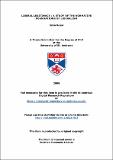Files in this item
Liberal legitimacy : a study of the normative foundations of liberalism
Item metadata
| dc.contributor.advisor | Skorupski, John | |
| dc.contributor.advisor | Cruft, Rowan | |
| dc.contributor.author | Rossi, Enzo | |
| dc.coverage.spatial | 174 | en |
| dc.date.accessioned | 2008-11-28T17:25:20Z | |
| dc.date.available | 2008-11-28T17:25:20Z | |
| dc.date.issued | 2008-11-27 | |
| dc.identifier.uri | https://hdl.handle.net/10023/563 | |
| dc.description.abstract | This thesis is a critique of the prominent strand of contemporary liberal political theory which maintains that liberal political authority must, in some sense, rest on the free consent of those subjected to it, and that such a consensus is achieved if a polity’s basic structure can be publicly justified to its citizenry, or to a relevant subset of it. Call that the liberal legitimacy view. I argue that the liberal legitimacy view cannot provide viable normative foundations for political authority, for the hypothetical consensus it envisages cannot be achieved and sustained without either arbitrarily excluding conspicuous sectors of the citizenry or commanding a consent that is less than free. That is because the liberal legitimacy view’s structure is one that requires a form of consent that carries free-standing normative force (i.e. normative force generated by voluntariness), yet the particular form of hypothetical consent through public justification envisaged by the view does not possess such force, because of its built-in bias in favour of liberalism. I also argue that the liberal legitimacy view is the most recent instantiation of one of two main strands of liberal theory, namely the nowadays dominant contract-based liberalism, which seeks to ground liberal political authority in a hypothetical agreement between the citizens. My case against the liberal legitimacy view, then, contributes to the revitalisation of the other main approach to the normative foundations of liberalism, namely the substantivist one, which legitimates liberal political authority through an appeal to the substantive values and virtues safeguarded and promoted by liberal polities. | en |
| dc.format.extent | 6679310 bytes | |
| dc.format.mimetype | application/pdf | |
| dc.language.iso | en | en |
| dc.publisher | University of St Andrews | |
| dc.rights | Creative Commons Attribution-NonCommercial-NoDerivs 3.0 Unported | |
| dc.rights.uri | http://creativecommons.org/licenses/by-nc-nd/3.0/ | |
| dc.subject | Liberalism | en |
| dc.subject | Legitimacy | en |
| dc.subject | Authority | en |
| dc.subject | Consent | en |
| dc.subject | Public justification | en |
| dc.subject | Public reason | en |
| dc.subject | Political liberalism | en |
| dc.subject | Rawls | en |
| dc.subject | Political philosophy | en |
| dc.subject.lcc | JC574.R7 | |
| dc.subject.lcsh | Liberalism--Philosophy | en_US |
| dc.subject.lcsh | Normativity (Ethics) | en_US |
| dc.title | Liberal legitimacy : a study of the normative foundations of liberalism | en |
| dc.type | Thesis | en |
| dc.contributor.sponsor | Arts and Humanities Research Council (AHRC) | en |
| dc.type.qualificationlevel | Doctoral | en |
| dc.type.qualificationname | PhD Doctor of Philosophy | en |
| dc.publisher.institution | The University of St Andrews | en |
This item appears in the following Collection(s)
Except where otherwise noted within the work, this item's licence for re-use is described as Creative Commons Attribution-NonCommercial-NoDerivs 3.0 Unported
Items in the St Andrews Research Repository are protected by copyright, with all rights reserved, unless otherwise indicated.


